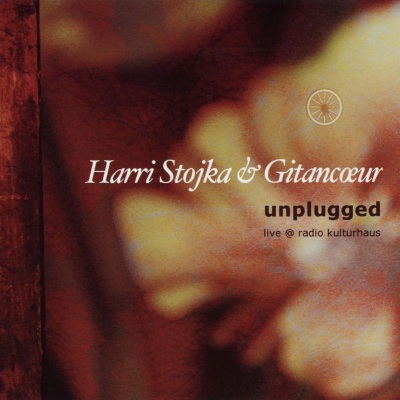
Unplugged (Remaster)
Hi everybody, this is Harri Stojka. This is the new CD of Gitancoeur and it’s a very special CD because it’s the first time that I play straight traditional gypsy music and I love it. Being a rock and jazz player, this style of playing and this style of music are a completely new experience to me, but the music is deep in my heart. While doing this CD I realized the roots and the history of my people because music says much more than a thousand words. The Gitancoeur Band: Harri Wakar Stojka – e-sitar and ac. guit. Claudius Jelinek – rhythm. guit. (first ac. guit. solo on "Minor Swing") Fernando Paiva da Silva – brush snare, cajon and voc. on “Bagara” Eva Berky-Samer – lead voc. and violin Doris Heela Weinrich – backing voc. Sissi Zigni Stojka – backing voc. and groovebox programming on “Bagara” Rudi Mille – keyb. on “Waregana” Special guests: Joschi Schneeberger – ac. bass Mongo Stojka – lead voc. on “Dosta Lowe” Recorded LIVE at Radiokulturhaus June 2002 Sound engineer Christian Sodl Produced by Christian Sodl, Harri Stojka and Christoph Moser All solos played by Harri Stojka Remaster by H.S. Special thanks to: Mag. Ing. Karl Steffek, Mag. Christiane Goller-Fischer, Dr. Eva-Maria Quatember, SKE-Fond – Mag. Markus Lidauer, Georg Hoanzl, Christoph Moser, Joschi Schneeberger, Mongo Stojka, Gundi Lamprecht, Herbert Stern and to the whole ORF Crew! Titles: BAGARA (Harri Stojka – Sissi Stojka) SHUDRO BAJI (Mongo Stojka) NA GAMAV (trad.) LASHI RACI (trad.) MURO JILORO (trad.) GELEM GELEM (trad.) JAI JAI (Doris Weinrich) WAREGANA (Mongo Stojka – Harri Stojka) ROMANSHAGO (Doris Weinrich) BO CERI (Doris Weinrich) DOSTA LOWE (Mongo Stojka) MINOR SWING (Stephane Grappeli – Django Reinhardt) gipsy.production Tel: +43 /(0)1/419 96 93 Fax: +43 /(0)1/419 96 93 Mobil: +43 /(0)664/24 36 545 email: gipsy.production@chello.at Infos: http://www.harristojka.com www.myspace.com/harristojka Bagara (story): "Bagara" is a tribute to our progenitor. Who was that Bagara.... the only thing we are sure of is that he lived in the middle of the 19th century! According to the stories handed down to us, his hair came down to his shoulders, he had sharp features and a dark complexion, piercing eyes, and he was tall and slim. Of course, many legends are centered around this extraordinary personality. One of these legends ... my father often told it to me ... was about Bagara's superhuman physical strength, he was as fast as the wind and endowed with an extremely sensitive ear...! When Bagara's brother was assaulted by robbers in the woods one night, he called out Bagara's name three times.... his brother was miles away... but he arrived in no time at all, saving the brother in distress.... this is what the legend says! There is no doubt that Bagara really lived. His name is too big and he is (still) too well reputed among the Rom to be a mere fairy-tale character! We are the Bagareshtshi (derived from Bagara's name) and we are proud of being the offspring of such an extraordinary man! Harri Stojka Shudro Baji (story): When our forefathers still traveled through the country, they stopped at certain places again and again. One of these was situated near Wiener Neustadt on the river Triesting, and the Rom named it Shudro Baiji – ice-cold water. Many Rom knew the location and they came from many different regions to meet other Rom there. Shudro Baiji was filled with life on such occasions. In the morning, the girls went to the river to do the washing, the boys took care of the horses. Women sat around the fire cooking meals. A few old men sat back, lit a pipe and watched the hustle and bustle around them. That was a long time ago! Shudro Baiji can't be found anymore. Shudro Baiji lives on in our memory. Na Gamav: Don’t ignore me! Lashi Raci: My girl is the only one I want to dance with. Muro Jiloro: I want to kiss your dark eyes. Gelem Gelem (story): This verse of Gelem Gelem was inspired by Roma in the Nazi concentration camps in World War II. Jai – Jai – Jai: The important things we need: to celebrate with other Rom. Waregana (trans.: SOMETIME and the story is): Waregana was written by Harri Stojka for his father Mongo Stojka. The song echoes the influence of real Viennese Lovara music (the Lovara being the Rom tribe which Harri Stojka belongs to), of what is called Romani Gila ("Rom songs"). All these songs are in minor keys, very measured, very slow. These songs of the Lovara are not influenced by the Hungarian Roma or the music of the Balkans. This is why it is safe to say that this form of Romani Gili emerged in Vienna only (another case in point is Mongo Stojka's great composition SAS MAN MAMO DOSTA LOWE – which translates as "Mother, I was once a rich man"). Waregana is Harri Stojka's tribute to this tradition and his father, to whom he owes a lot. Romanshago: That’s our way to enjoy life: dancing and singing. Bo Ceri: You are my lucky star. Dosta Lowe: Love is more important than money. Minor Swing: Sinti-Jazz
